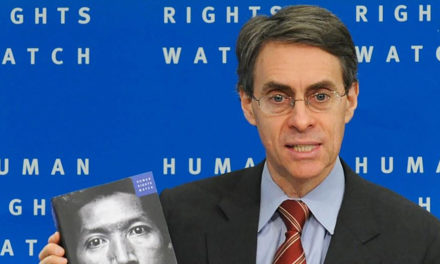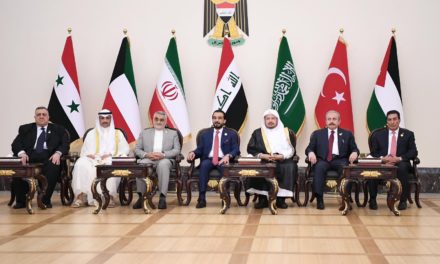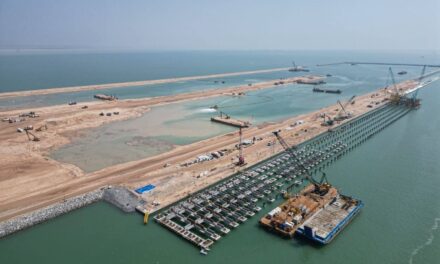On the 4th of April 2018 Iraqi Prime Minister Haider Al-Abadi, accompanied by a high-level delegation, headed to Japan. The visit lasted four days and Iraq received a big welcome. The main focus was economy and investment, so much, that some observers called it a minimized rebuilding conference, referring to the Iraq Rebuilding Conference event, taking place last February.
Japan showed some enthusiasm and readiness to enter the Iraqi market, reflecting optimism about Iraq’s future and expressing confidence in the direction the Iraqi government is heading. It is possible to categorize the main themes of the visit as follows.
The first theme was that about investment. Iraq made sure to show that there are huge investment opportunities for Japan in all of Iraq’s provinces, not only in the ‘liberated provinces’. Although Iraq’s southern provinces are safer that the rest of Iraq, indicators shows that they suffer from relatively high levels of poverty and lack of services. Hence, it is important that the rebuilding efforts do not exclude them.
The second theme was the internally displaced people. Abadi made sure to present the government’s success in returning half of the internally displaced to their homes, and that this process happened peacefully and without coercion as some political parties kept claiming in the past.
The third theme was the militarization of Iraq’s society. Abadi explained his government’s efforts to limit the use of weapons amongst Iraq’s communities and keeping them in hand of the state.
The fourth theme was about technical education in Iraq. Abadi made sure that an important goal of his visit was finding means to improve technical education in the country, given that it plays an important role in creating jobs and professionalizing services in the country.
Last but not least, one of the important themes of the visit was about Iraq’s role in international security. Abadi reiterated his statement that Iraqis didn’t fight only for Iraq but for the rest of humanity as well.
In response, the Japanese Prime Minister Shinzō Abe applauded Abadi’s leadership role in defeating ISIS and allegedly said: “Just like you in Iraq call Japan a planet, one day Iraq will also be a planet in its own,” referring to the name Iraqis have given Japan to express their admiration of the countries advanced technologies and services.
Furthermore, Japan also decided to continue supporting Iraq in its rebuilding efforts and encouraging its companies to invest in the country. This manifested itself in Japan’s prime minister decided to reduce, based on Abadi’s presentation of the situation, the country risk of Iraq for Japanese citizens which will help Japanese companies and investors enter Iraq’s markets. Furthermore, a portfolio of agreements that aim to develop the infrastructure and services in the country. Here are the most important ones.
- Iraq and Japan signed an agreement to finish Basra’s Supply Improvement Project in Al-Hartha which will provide water to the citizens of Basra.
- Iraq and Japan signed an agreement of land reclamation for the areas between Euphrates and Tigris to the second phase of Iraq’s irrigation project.
- The trading company Sumitomo expressed its readiness to build a Japanese car manufacturing plant and after-sales service.
- The head of the Japanese External Trade Organization (JETRO) decided after meeting with Abadi to expand its office in Iraq and send its companies to invest in the country.
- Toyo Engineering Cooperation expressed its willingness to invest in Iraq’s accompanying gas and help Iraq to gain revenue from it instead of burning it.
- Toyota Tsusho Cooperation will provide 12 mobile power generation facilities with the capacity of 132 KV each, where most of them will be operational before summer of 2018 in order to increase the production rate of power-generation in Iraq.
- Mitsubishi Hitachi pledged to help Iraq in the rebuilding process and that through several projects, amongst them the rehabilitation of Al-Hartha power generation plant in Basra and the possibility of expanding it so that it can provide more power for Basra citizens.
- Japex expressed its readiness to increase its investments in Iraq’s oil and gas sector, especially in Nasriya, up to $4.5 billion which will create jobs in the province in addition to building training and development centers for Iraqis.
Without a doubt, Japan is very much present in Iraq. A clear indicator is the appointment of Japan’s popular ambassador Fumio Iwai, and Japan’s continuous participation in the important events pertaining Iraq. Abadi’s visit to Japan, however, was a success and is a clear indicator that the later will play an even more important role in Iraq’s rebuilding process.

Muhammad Al-Waeli
Muhammad Al-Waeli is an Iraqi commentator on political and social issues. He is currently doing a PhD in Human Resource Management and is interested in politics, media, and development.










